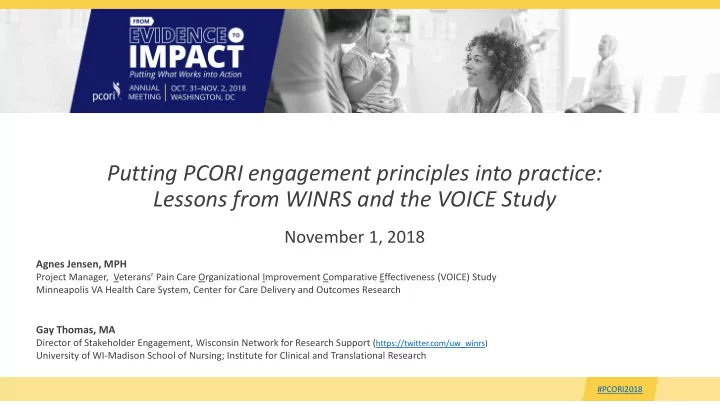

Putting PCORI engagement principles into practice: Lessons from WINRS and the VOICE Study November 1, 2018 Agnes Jensen, MPH Project Manager, Veterans’ Pain Care Organizational Improvement Comparative Effectiveness (VOICE) Study Minneapolis VA Health Care System, Center for Care Delivery and Outcomes Research Gay Thomas, MA Director of Stakeholder Engagement, Wisconsin Network for Research Support ( https://twitter.com/uw_winrs) University of WI-Madison School of Nursing; Institute for Clinical and Translational Research #PCORI2018
Agnes Jensen and Gay Thomas • No conflicts to disclose. 2 • November 21, 2018
Objectives At the conclusion of this activity, the participant will be able to identify how engagement principles can be applied to: • Recruit patient advisors • Prepare advisors for their work on project • Plan effective meetings with advisors • Sustain ongoing engagement of advisors 3 • November 21, 2018
PCORI Engagement Principles Co-Learning Partnership Transparency Reciprocity Honesty Trust 4 • November 21, 2018
Apply engagement principles to recruit patient advisors • Encourage co-learning by recruiting a diverse advisory panel • Considered veterans representing variety of backgrounds, medical experiences • Utilize application process to build partnership • Conducted “360 degree” telephone interviews • Build foundation of trust/transparency • Clearly stated goals for project, roles of the panel 5 • November 21, 2018
Apply engagement principles to prepare patient advisors • Research team’s “a-ha moment” • Patients are experts on their own lives – not research (and that’s ok!) • Initial meeting/orientation • Provide “just enough” background • Build community • Develop ground rules • Clarify respective roles/responsibilities (Membership Agreement) • Discuss using life experience to give effective feedback • Work with real research materials 6 • November 21, 2018
Apply principles to plan effective meetings with advisors • Well-planned monthly meetings • Cover 1-2 focused topics • Provide materials for review before meeting • Decide on process to generate advisor feedback • Consistent meeting format • Allow time for advisors and research team to “check in” • Provide update on study progress • Report how previous feedback was used by researchers • Review new topics/materials with patient advisors 7 • November 21, 2018
“Reporting back”: co-learning, transparency, trust in action 8 • November 21, 2018
Apply principles to sustain advisor engagement • Provide fair compensation, reasonable requests for time • Look for unique engagement opportunities for your advisors • Share opportunities equally among members • Evaluate advisors’ experiences periodically; make adjustments 9 • November 21, 2018
WINRS Practice-based Evidence • Orientation evaluations by patient advisors • Highlights: community-building, roles/responsibilities, feedback on research materials • Interviews with patient advisors • Themes: Value of orientation, commitment to group, impact of “reporting back”, appreciation of diversity • “Debriefs” with research teams • Comments: Effective engagement 1) requires appropriate staffing, relevant toolkits, coaching, 2) produces concrete improvements that exceed expectations 10 • November 21, 2018
Want to learn more? WINRS Resources Visit the WINRS website: https://winrs.nursing.wisc.edu/ Click on “Resources” tab to check out our – Toolkits – Journal articles Sign up for our newsletter, the WINRS Wire Follow us on Twitter: @UW_WINRS Contact us on our website or grthomas@wisc.edu 11 • November 21, 2018
Questions? 12 • November 21, 2018
Thank You! Agnes Jensen Project Manager, Veterans’ Pain Care Organizational Improvement Comparative Effectiveness (VOICE) Study Minneapolis VA Health Care System, Center for Care Delivery and Outcomes Research Agnes.Jensen2@va.gov Gay Thomas Director of Stakeholder Engagement, Wisconsin Network for Research Support (WINRS) University of Wisconsin-Madison School of Nursing; Institute for Clinical and Translational Research grthomas@wisc.edu 13 • November 21, 2018
Recommend
More recommend